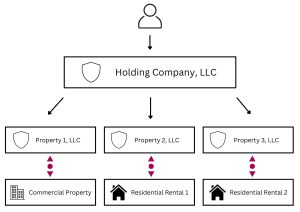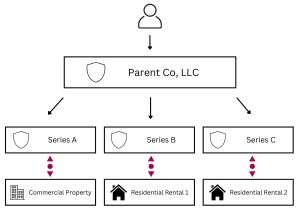Using the Series LLC Structure for LLCs
A series limited liability company is a special form of LLC that is authorized by state law to hold assets in one or more series. Each series serves as a liability container. Series LLCs are often used as an alternative to a holding company structure. The goal of a series LLC is to separate assets so that the debts and obligations of one asset cannot infect other assets of the same company. When the company establishes a series of assets, each asset is treated as though it were owned by a separate company. As a result, the liabilities of one series are generally limited to the assets held by that series.
Series LLCs are most often used in the real estate development context. For example, a real estate developer might form a series LLC to hold real estate. Each property that the developer acquires could be held in a separate series. If a lawsuit arises in connection with one of the properties, the other properties would not be at risk.
Comparison to Holding Company Structure
To understand the allure of series LLCs, it is helpful to view them in the liability protection context. Most asset protection plans involve separation of assets. The goal is to place any risky assets into self-contained “buckets” that are separate from other assets. This stops liability from spreading from the risky asset to other assets.
Separation of assets has traditionally been through a holding company structure. This strategy requires the formation of multiple LLCs. Let’s assume, for example, that a real estate investor owns one commercial rental property and two residential rental properties. In a traditional holding company structure, the investor would form a property LLC to hold each property and a parent holding company to own each property LLC.

In this holding company structure, four separate LLCs are needed to isolate liability at the property level. Series LLCs are designed to achieve the same result with a more efficient structure. Instead of forming a holding company and one or more subsidiaries, the owner can form one LLC. The LLC can then create separate series to separate assets and contain liability to each series. In the example above, the investor could set up a single LLC and form a separate series for each rental property.


Unlike the holding company structure (which required four LLCs), the series LLC structure requires only one LLC. At the property level, liability is protected through the use of separate series to hold each property.
Characteristics of Series LLCs
The first series LLC statute was enacted Delaware in 2006. Although there are variations among the states, most states define series LLCs similar to the Delaware act:
A limited liability company agreement may establish or provide for the establishment of 1 or more designated series of members, managers, limited liability company interests or assets. Any such series may have separate rights, powers or duties with respect to specified property or obligations of the limited liability company or profits and losses associated with specified property or obligations, and any such series may have a separate business purpose or investment objective.1
This definition reinforces the key purpose of series LLCs: separation. This becomes apparent when the paragraph is dissected.
- One or more “series of members, managers or limited liability company interests”
- “Separate rights, powers or duties with respect to specified property of the limited liability company”
- “Separate rights, powers or duties with respect to … of the limited liability company or profits and losses associated with specified property or obligations”
- “Separate business purpose or investment objective”
Note the application of the word “separate.” Each series in the LLC is intended to be separate from other series.
The concept of separation is also part of the operations of each series. Del. Code Ann. Tit. 6, § 18-215 (and the corresponding provision of most other state series LLC acts) specifically provides that liability will only be limited to a particular series if “the records maintained for any such series account for the assets associated with such series separately from the other assets of the limited liability company.”
Uses of Series LLCs
Series LLCs began in the investment world and are still used in that context. Series LLCs were first intended to segregate funds without requiring the parent company to file separate SEC filings for each individual fund. Institutional investors still use the series structure. The Alphonse case—one of only a handful of cases that involve LLCS—involved the use of a series LLC to hold separate mortgage assets.
Series LLCs are popular with real estate investors and are most often used in the real estate investment context. Instead of creating an LLC for each asset, the owner can create one Series LLC and then divide that LLC into separate series for each property. The liability associated with each property is—at least in theory—confined to the series in which the property is held.
Series LLCs can also be used to divide a business into separate subsidiaries without having to form multiple companies. For example, a large business might separate series for different departments, equipment, jurisdictions, locations, customers, divisions, franchises, product lines, projects, vehicles, services, or other business components.
What to Name a Series of a Series LLC
Most state laws have straightforward requirements for business names. These requirements usually state that the name must include the phrase “limited liability company” or an abbreviation like “LLC” and must not be confusingly similar to other companies.
Because states are uniform in their approach to LLC names, a person forming an LLC would use the exact same name regardless of the state of filing. For example, “Acme LLC” is a valid name for the LLC regardless of whether it is formed in Texas, California, or any other state.
State Law Approaches to Name Requirements for Individual Series of a Series LLC
This uniform approach does not apply to the names of individual series of a series LLC (if you’re unfamiliar with series LLCs, see our article on What are Series LLCs). There are currently thirteen states that allow series LLCs. These states take three different approaches to series LLC naming requirements:
- No statutory requirement for naming a series. Some states, like Alabama and Delaware, contain no requirements for naming of a series. This leaves it up to the owners of the LLC to work out the naming on their own.
- Assumed name filing. Like Alabama and Delaware, Texas series LLCs can name individual series as the members or managers see fit. But to conduct business in the name of the series, Texas law requires the filing of an assumed name certificate.
- Parent LLC name must be included in series name. Other states require the name of each individual series to state the name of the parent LLC. This practical requirement ensures that anyone who deals with the LLC can trace the series back to the parent LLC in the public records. Some of these states (Illinois, Kansas) require a public filing when the series is created, while others (Iowa, Utah) do not.
Practical Guidance on Series Names
It is noteworthy that none of the states prohibit the series LLC from using the name of the parent in the name of the series. As mentioned, this may be best practice because it allows third parties who are dealing with a series to identify the parent in the public records.
Taking it a step further, the Limited Liability Company Protected Series Act (Series Act) contains the following requirements:
- The name of the series must begin or end with the name of the parent LLC, including any word or abbreviation required by the applicable LLC name statute; and
- The name of the series must contain the phrase “Protected Series” or “protected series” or the abbreviation “P.S.” or “PS.”
Pulling this altogether, it is best practice to include both the name of the parent LLC and the phrase “Protected Series” or an abbreviation. For example, if the series LLC is Arch Bay Holdings LLC and one of its series will be identified as 2032B, the name of the series could be “Arch Bay Holdings LLC Series 2023B P.S.” This naming convention is permitted by all state acts and will help ensure that the series will be respected in other states that adopt the Series Act.
